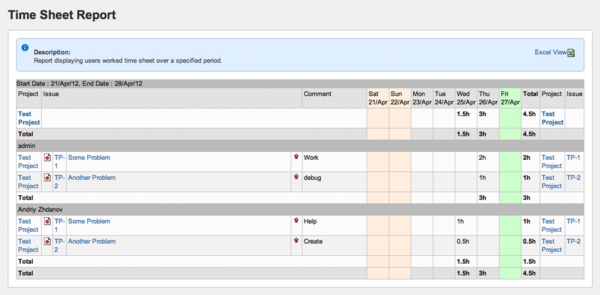Each week, Marketplace Monday profiles one great add-on available in the Atlassian Marketplace–where you can try and buy more than a thousand add-ons for Atlassian products.
Overview
While many of the best add-ons available in the Marketplace are verifiable businesses, supporting a team of developers and marketers, the Jira Timesheet Reports and Gadgets Plugin by Andriy Zhdanov is proving that individual developers can create top sellers in the Atlassian Marketplace too. The secret to Jira Timesheet’s success is simple–take one of Jira’s features (logging time on issues) and extend it by bringing reports directly to Jira project pages and gadgets to the Jira dashboard. The reporting and exporting features of Jira Timesheet allow Jira users to add exceptional functionality in the form of reports and gadgets for a great price.
Simple time tracking
Jira Timesheet adds reporting functionality to Jira’s built in time tracking and complements other great time tracking add-ons for Jira. As users log time spent working on issues, they accumulate data that can be used for official time tracking or for managers to review how employees are allocating their time between projects. Alternatively, they can see which projects are eating up large portions of employee time, and project pivot reports can display time spent on each individual issue within a project.
Reports
The core of Jira Timesheet is the Time Sheet Report and the Project Pivot Report. When combined with attentive time tracking on issues, both reports offer fantastic insight into how work hours are spent in large and small organizations.
The Time Sheet report is the most extensive report in Jira Timesheet. It shows a column-by-column view of the hours each Jira user spent working on issues in a project going back up to two months. By default, rows are grouped by user, then project, then broken down into individual issues; however, the add-on allows you to specify certain projects, users, or groups of users (such as the QA team). The table can also display additional information pulled from issue fields and filter by issue type, or use one of the logged-in user’s custom Jira filters. A number of further customizations are available in the add-on, and since the code is open source, users can make modifications themselves.
Alternately, the Project Pivot Report aims to provide a more detailed overview of individual projects. A project’s issues are listed in rows with the total time each Jira user logged on that issue displayed across the columns. This report allows managers to see which issues are hogging resources in a given project in the context of other issue details like type, status, and priority.
Gadgets
Dashboard gadgets are available for individual Time Sheet reports, group Time Sheets, and the Project Pivot Report.  This allows Jira Timesheet users to embed frequently used reports right on their Jira dashboards, providing easy, consistent access. For managers and team leads, this is a great place to track a team’s day-to-day work and ensure that team resources are matched up with broad priorities.
This allows Jira Timesheet users to embed frequently used reports right on their Jira dashboards, providing easy, consistent access. For managers and team leads, this is a great place to track a team’s day-to-day work and ensure that team resources are matched up with broad priorities.
Individual Feature Requests
One of the advantages of individual developers support add-ons is that they can implement features upon request from customers. Three examples:
- TIME-255: Two additional gadgets joining the three existing ones
- TIME-234: Additional view options for gadgets
- TIME-223: A slider to adjust the two week interval backwards and forwards in time
The X-Factor: RESTful Timesheets
In the latest release of Jira Timesheet, Andriy fulfilled another feature request, TIME-269. This implemented a REST endpoint for the Jira Timesheet extension. With REST, users and other developers can use the power of the Jira Timesheet add-on and pull raw JSON or XML data into other applications or locations, making it an even better value.
Andriy created this video to introduce the Jira Timesheet Reports and Gadgets Plugin. It’s available in the Atlassian Marketplace for $10 for under 50 users.
[youtube http://www.youtube.com/watch?v=ofocpgsf-AY?rel=0&w=560&h=315]
You can now get great add-ons like Jira Timesheet straight from the Universal Plugin Manager, which is available in Jira, Confluence, and our developer tools. If you’re running UPM 1.6 or later, just check the plugin manager to update to the latest version. Otherwise, download it manually from the Atlassian Marketplace. Read more about the awesome updates the Atlassian Ecosystem team is bringing to the add-on experience!


